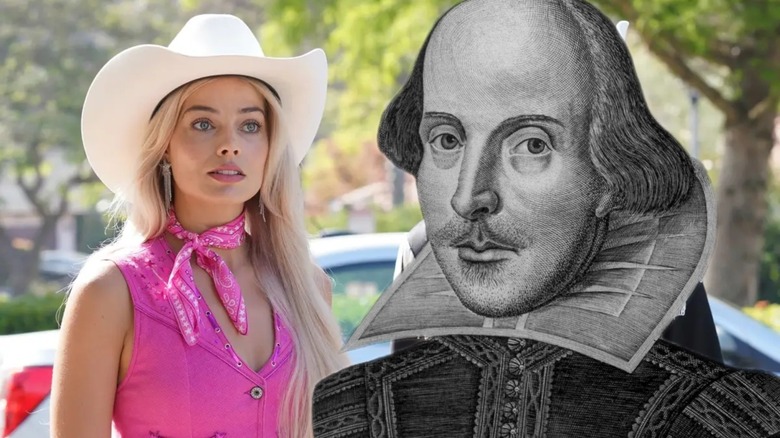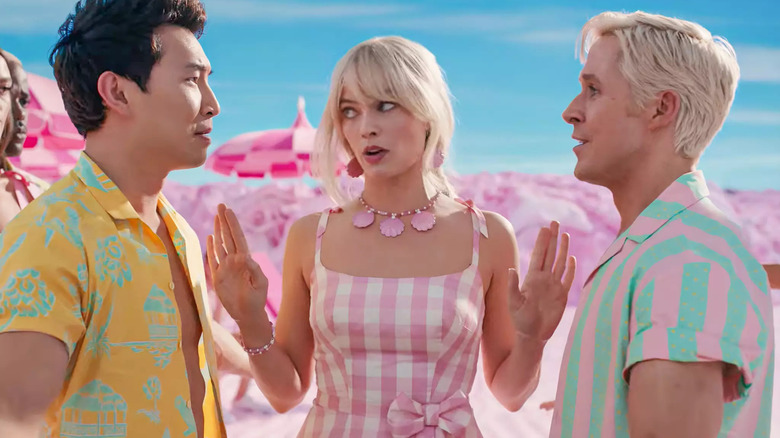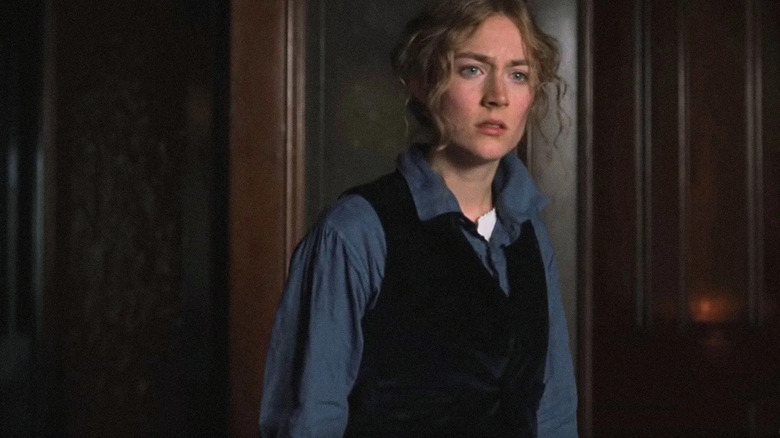Greta Gerwig's Barbie Took Unexpected Inspiration From Shakespeare
When comparing Greta Gerwig's film "Barbie" to ancient writings, one might find that it bears the strongest resemblance to the Book of Genesis. Barbie and Ken are Adam and Eve, Barbieland is the Garden of Eden, and the Patriarchy is the Forbidden Fruit. Ken also serves as the Serpent in this metaphor. Unlike in Genesis, however, Eden remains the blissful paradise it always was at the end, and it's Barbie who leaves to grow up.
Gerwig has been open about the unexpected spiritual influences on "Barbie," having written an Apostle's Creed for her lead character. She also once noted that Barbie was created first, in 1959, with Ken hitting the market in 1960. Barbie was alone in the Garden before God created Ken out of her rib. Gerwig also held what she called "movie church" every Sunday while filming "Barbie," inviting her cast to worship at the alter of cinema at a local movie house in London.
But it seems that Gerwig also took tonal and dramatic cues from the Bard of Stratford. In a July interview with W Magazine, Gerwig talked at length about the spirit of her new film, and her attempts to bring artistry and an independent spirit to a major studio production based on a Mattel product. The director said that she wanted an aesthetic and architecture that felt and looked massive. In an artificial world of living dolls, there was no sense in playing it small. She noted — with modesty — that her goals were similar to those of William Shakespeare, whose stories frequently towered over their audience, and whose aesthetic approach was to make a small stage as large as possible.
O for a Muse of fire
When it came to the scope of "Barbie," Gerwig seemed to refer to some of Shakespeare's earlier plays, notably his York tetrad ("Henry the VI" parts 1 through 3, and "Richard III") or the Grand Guignol "Titus Andronicus." Those plays tended to have the maximalist approach she wanted to emulate. When it came to tone, however, Gerwig cites the lighthearted romantic spoofery of the Bard's comedy plays. Gerwig wanted to make it utterly clear that she was not comparing her work to that of William Shakespeare but admitted to the powerful influence his work had on hers. She said:
"I always think about the architecture of what we have in this film and the ontology of Barbie [in relation to] what I love so much about Shakespeare's comedies. Stay with me. I'm not saying I'm Shakespeare. But I do think Shakespeare was a maximalist. There wasn't anything that was too far or too crazy that couldn't be worked through, and then there'd be something in the middle that felt quite human. I was thinking about it in those terms: a heightened theatricality that allows you to deal with big ideas in the midst of anarchic play."
One might look to a play like "As You Like It," in that regard. It's a whimsical play about a woman named Rosalind who flees into the woods and playfully disguises herself as a man to hoodwink her beloved, Orlando. In the middle of all the comedy and delightful romantic misunderstandings is the character of Jaques, a realist. He's the one who gives the immortal "All the world's a stage" speech wherein he lays out the Seven Stages of Man. Profundity in the middle of fluff.
Barbie March
Of course, the closest literary allusion one can make to "Barbie" is Louisa May Alcott's 1868 novel "Little Women," which Gerwig herself famously adapted to film in 2019. In the middle of "Little Women," Jo March (Saoirse Ronan) gives a speech about the difficulties of merely being a woman in the 1860s. "Women, they have minds, and they have souls, as well as just hearts," Jo says in a speech Gerwig wrote. "And they've got ambition, and they've got talent, as well as just beauty. I'm so sick of people saying that love is just all a woman is fit for." This speech mirrors one made by the character played by America Ferrera in "Barbie," wherein she sums up all the modern stresses and contradictory social messaging experienced by 21st-century women.
Gerwig most certainly saw the thematic parallels between "Barbie" and Alcott, noting that all her films to date have shared a similar thematic vibe. She notes that the wistful bliss of childhood eventually falls away in every one of her movies. Gerwig said:
"In some ways, all the movies I've co-written, written and directed are all talking to each other. It is almost a mystery to me when I'm in the middle of it. And then when I step back, I think, 'Oh, you continue to be interested in women. This is something you're fascinated by.' That ache of contradictions, of never being able to totally bridge that gap between adulthood and childhood, is present in this movie, too. It's this overflowing sense of joy, and then it's also, 'I can never get back there.'"
At last measure, "Barbie" is the 20th highest-grossing film of all time.


